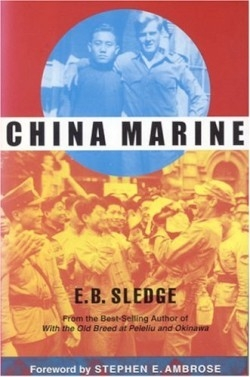China Marine
After fighting in heavy combat in Peleliu and Okinawa
during WWII, Fifth Division Marine Sledge was transferred to China to serve out the rest of his duty. In this book, the author fleshes out this time of experience, exploration, and self-education. Even after fifty years, Sledge reflects that, to him, the war was a “giant killing machine into which we were thrown to endure fear to the brink of insanity.” Luckily for the reader, Sledge was a physical and mental self-disciplinarian, able to cope with his horrific combat experiences by absorbing fully his less-volatile duty defending China from Communism.
Sledge takes the reader along from his transfer to duty in China to his return to civilian life, two years after leaving home. His talent for detailed observation (which later led him to success in the field of biology) allowed him to tie anecdotes about his considerably wilder fellow Marines and their raucous and unhealthy behavior directly to the astounding and historical landscape in which these experiences took place. Although Sledge (nicknamed “Sledgehammer” by his fellow Marines) did not participate in the usual activities of “liberty” time—drinking and womanizing—he respected his comrades’ right to do so and was often amused when they suffered the consequences; even after the warning was given that “a man would have his pay docked for any days missed due to a VD infection.”
In the same chapter, he describes his awe at visiting the Forbidden City, where he “felt like a child again, looking at a fable castle in a storybook.” Among descriptions of harsh nights of guard duty during the Chinese winter and dodging stray bullets and random Communist fire are stories of the deep and meaningful friendships that he developed with a Chinese family called Sooing Taifoo, with Father Marcel von Hemelryjck (a Belgian priest with whom he remained in contact for several years) and with Hao, a local boy who taught him Chinese.
Encouraged by his wife Jeanne to write about his memories to combat nightmares and flashbacks, Sledge offers the reader a glimpse of the emotional and physical battles that were played out for him during and after the war. After returning to the States in 1946, Sledge became a professor of Biology at the University of Montevallo, Alabama. His first book about his experiences during the war, With the Old Breed at Peleliu and Okinawa, was published in 1981. This memoir includes a reading list for the curious reader and a foreword by Stephen Ambrose.
Reviewed by
Kristin Putchinksi
Disclosure: This article is not an endorsement, but a review. The publisher of this book provided free copies of the book to have their book reviewed by a professional reviewer. No fee was paid by the publisher for this review. Foreword Reviews only recommends books that we love. Foreword Magazine, Inc. is disclosing this in accordance with the Federal Trade Commission’s 16 CFR, Part 255.

